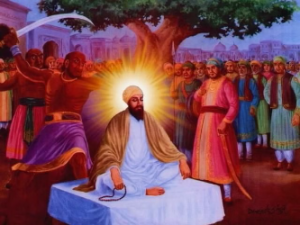 There is a story about Mata Damodari, Guru Hargobind's wife, that I read several years ago in Max Macauliffe's The Sikh Religion.
There is a story about Mata Damodari, Guru Hargobind's wife, that I read several years ago in Max Macauliffe's The Sikh Religion. It is my habit to go back to these volumes from time to time, searching especially for stories that involve women: stories that I find often present a deep lesson for me to meditate upon. Because, I feel that the spiritual journey of a woman is unique and different from the spiritual journey of a man. The pressures that women face are different, the psyches are different, the concerns are different. While the Guru Granth Sahib offers One Truth for all people, these stories often give insightful clues about how a woman can apply those truths to the particular challenges that she faces in life.
The story about Mata Damodari centers on her apparently innocent refusal to give her husband sweets for his Sikhs.
There is a powerful message in the story and it has haunted me from the first time that I read it.
The story goes that a group of travelling Sikhs came to visit Guru Hargobind late one night. They brought offerings for the Guru. The Sikhs were tired and hungry, having traveled a long distance. Being a gracious host, the Guru asked his sevadars to prepare them dinner. Unfortunately, the cooking fires had already been extinguished for the day, and the cooks had gone home.
 Guru Sahib remembered that there was a room filled with sweets in anticipation of his daughter, Viro's, upcoming wedding. His wife, Mata Damodari had the only key to the room. When the Guru asked his wife to open the room and to share the sweets with his hungry Sikhs, she refused. She didn't think it was appropriate for anyone to partake of the sweets until the bridegroom's family arrived and were served first, as was the custom then.
Guru Sahib remembered that there was a room filled with sweets in anticipation of his daughter, Viro's, upcoming wedding. His wife, Mata Damodari had the only key to the room. When the Guru asked his wife to open the room and to share the sweets with his hungry Sikhs, she refused. She didn't think it was appropriate for anyone to partake of the sweets until the bridegroom's family arrived and were served first, as was the custom then.
One has to wonder what thoughts Mata Damodari was struggliong with at that moment.
Yet, there is much in the image that evokes the insecurity Mataji must have felt about the upcoming wedding. Only she had the key to the room. Which means she must have been concerned that someone was going to take the sweets that were meant for her daughter's marriage.
Maybe it is too simplistic to say it, but in my own experience, that territoriality is something that we women, especially, can get caught in. We want to lock up what we believe is rightfully ours and use it for our own purposes. Men might be more inclined to think, "What's the big deal? You can always find more sweets." But women sometimes suffer from a deeper insecurity. When we have something, we can cling to it fiercely rather than letting it go and trusting that something of equal or better value could come along to replace it.
 In any event, the Guru asked her to bring them out.
In any event, the Guru asked her to bring them out.
Mataji refused.
The Guru requested again.
Mataji refused again, citing her reasons - she did not want to offend the bridegroom's family.
The requests and refusals went on and on until the Guru finally gave up. But when He surrendered the fight, He also predicted the outcome.
"My Sikhs are dearer to me than life. If they were the first to taste the sweets, all the obstacles to the marriage would have been removed. But now the Mughal forces will come and take the sweets for themselves. When traveling Sikhs come to our house and leave disappointed, it is a just consequence that the sweets should go to strangers and the marriage be interrupted."
When I meditate upon this scene in my mind, I don't believe the Guru was rebuking his wife for refusing to abide by his request. Rather, I believe he was trying to help her understand the principles of Hukam, and the Hand of the One that guides everything.
Ultimately, there are no coincidences.
The art of life is to respond to what is - to what happens in each moment.
By meditating on Gurbani, we develop an intuitive sensitivity that allows us to see that Unseen Hand at work, and to consciously flow with it.
Sometimes, though, we have a picture in our minds of what we want the future should look like. And we challenge any situation that doesn't match the picture of what we think "should be." When we cannot flow with the demand of the moment, when we become protective and territorial over what we have, even when another person needs our help, it creates a negative consequence. When we are selfish, we attract our own destruction. Especially around the very thing we are being selfish about.
So, Mata Damodari, who protected the sweets for her daughter's wedding to the point of refusing her husband's hospitality to the guests, found herself in a very different situation on the wedding day. A situation she could have never possibly imagined or prepared herself for.
An argument broke out during a hunting expedition between a group of Sikhs and a platoon of Mughal Emperor Shah Jahan's troops. And because of the argument, the Emperor sent his General, Mukhlis Khan, to punish the Sikhs.
News of the pending attack arrived in Amritsar on the evening that the marriage songs for Viro's wedding were being sung by the women in the Guru's home. The family and other citizens of Amritsar had to pack quickly and leave. Many valuables for the wedding were left behind, including the sweets.
A contingent of 25 Sikhs remained behind at the Lohgarh fort on the outskirts of Amritsar and fought the Emperor's troops bravely. Though they killed hundreds, eventually, they fell. The Emperor's forces made it to the Guru's palace. They did not find the Guru there, but they did find the sweets.
 The Guru's family was taken at first to Ramsar. When they arrived, they realized a terrible mistake had been made. Not only were many of the valuables for the marriage left in Amritsar, somehow Viro, herself, had been left behind, as well. Guru Hargobind charged two of his men with rescuing his daughter. She was hiding silently in the upper floors of the home while the Emperor's forces were gorging themselves on the sweets that the Guru's family had left behind. The two Sikh men, Singha and Babak, succeeded in rescuing Viro, but barely.
The Guru's family was taken at first to Ramsar. When they arrived, they realized a terrible mistake had been made. Not only were many of the valuables for the marriage left in Amritsar, somehow Viro, herself, had been left behind, as well. Guru Hargobind charged two of his men with rescuing his daughter. She was hiding silently in the upper floors of the home while the Emperor's forces were gorging themselves on the sweets that the Guru's family had left behind. The two Sikh men, Singha and Babak, succeeded in rescuing Viro, but barely.
What follows in Macauliffe's history is another nine pages describing the subsequent military maneuvers and battles between Guru Hargobind's forces and Mukhlis Khan's.
Scenes of bravery. Scenes of bloodshed.
And so very many deaths - deaths on the side of the Emperor's forces, death of the Guru's faithful Sikhs. Guru Hargobind eventually destroyed Mukhlis Khan's large army, to the Emperor's dismay. The bridegroom's party joined the Guru's family in Jhabal where Viro was married at last. But what a different wedding than had been planned.
This story shakes me to my core.
Is it really the truth that by refusing to share her sweets, Mata Damodari attracted a war? Can such acts of selfishness have such consequences? If Mata Damodari had allowed the Guru those sweets for the Sikhs, would it have averted all the deaths that followed? All the pain and suffering of the families on both sides who lost someone they loved?
Is this then, the essence of Hukam, of Cosmic Law?
That we do have, as human beings, the choice to say no, to refuse, to maintain our territory. But those choices come with consequences more dire than what we can imagine or predict?
In the Big Picture, Guru Hargobind had his own destiny to fight the battles that he fought. And the One Hand does move us all, even when we make a choice that can lead down a dark road.
What meditating upon this story gives me, however, is a sense that - when it comes to the battle of Dharma - small acts of kindness, of giving, and of sharing contribute to the peace of the world in more powerful ways than we know.
The lesson in Mata Damodari's choice illustrates to me how important and consequential those small acts of kindness - or unkindness - can truly be.
Image, first on top - from painting by Renate Dartois.






